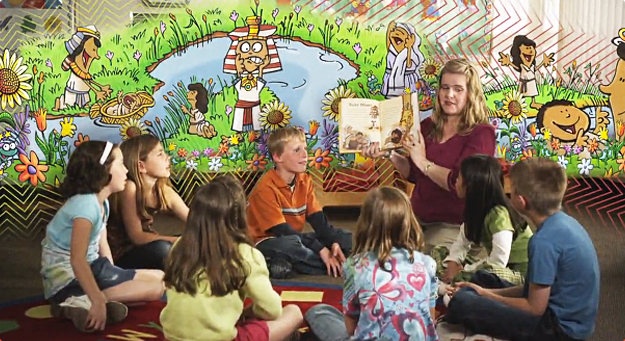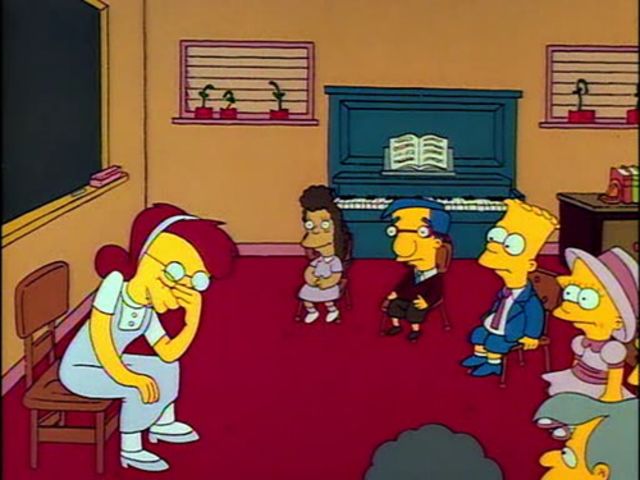Church plants these days, especially those of the hipster or urban-chic variety, are much less likely than in previous generations to include Sunday School. An institution that began among Anglo-American Protestants around 1820 to provide instruction in the rudiments of learning for children who worked during the week and could not attend common or private schools, by 1870 — thanks to the rise of public schooling and compulsory attendance laws — had become a vehicle for educating children in Scripture and Christian song. It is hard to believe, but Sunday school was arguably more influential than church services, likely because parents did not have to go and because it was less churchly than the churches themselves. Along with Vacation Bible School, Sunday school was a significant vehicle in extending the reach of Protestant Christian civilization.
That is, at least, the strong conclusion that confronts readers of memoirs by H. L. Mencken and Eudora Welty. I am teaching a seminar this term on memoir and Sunday school figured prominently in the childhood of these two very different writers, separated almost by a generation (Mencken was born in 1880, Welty in 1909). First Welty:
Both our parents had grown up in religious households. In our own family, we children where christened as babies, and were taught our prayers to say at night, and sent as we were growing up to Sunday school, but ours was never a churchgoing family. At home we did not, like Granpa Welty, say grace at table. In this way we were variously different from most of of the families we knew. On Sundays, Presbyterians were not allowed to eat hot food or read the funnypapers or travel the shortest journey; parents believed in Hell and believed tiny babies could go there. Baptists were not supposed to know, up until their dying day, how to play cards or dance. And so on. We went to the Methodist Episcopal Church South Sunday School . . . .
In the primary department of Sunday school, we little girls rose up in taffeta dresses and hot white gloves, with a nickel for collection embedded inside our palms, and while elastic bands from our Madge Evans hats sawed us under the chin, we sang songs led and exhorted by Miss Hattie. This little lady was a wonder of animation, also dressed up, and she stood next to the piano making wild chopping motions with both arms together, a chair leg off one of our Sunday school chairs in her hand to beat time with, and no matter how loudly we sang, we could always hear her even louder: “Bring them in! Bring them in! . . . Those favorite Methodist hymns all sounded happy and please with the world, even though the words ran quite the other way. “Throw out the lifeline! . . . went to a cheering tune. I was sinking deep in sin, Far from the peaceful shore, Very deeply stained within, Sinking to rise no more” made you want to dance, and the chorus — “Love lifted me When nothing else would help, Love lifted me!” — would send you leaping. . . . many of the Protestant hymns reached down to us from the same place; the were old English rounds and dance tunes, and Charles Wesley and the rest had — no wonder — taken them over. (One Writer’s Beginnings, 31-32)
Not to be outdone, here is Mencken on the joy that Sunday school brought to boys:
The one thing I really remember about that Sunday-school is the agreeable heartiness of the singing. It is, of course, the thing that all children enjoy most in Sunday-schools, for there they are urged to whoop their loudest in praise of God, and that license is an immense relief from the shushing they are always hearing at home. . . .
My favorite then, as now, was “Are You Ready for the Judgment Day?” — a gay and even rollicking tune with a saving hint of brimstone in the words. . . . We grouped it, in fact, with such dolce but unexhilarating things as “In the Sweet By-and-By” and “God Be With You Till We Meet Again” – pretty stuff, to be sure, but sadly lacking in bite and zowie. The runner up for “Are You Ready?” was “I Went Down the Rock to Hide My Face,” another hymn with a very lively swing to it, and after “the Rock” come “Stand Up, Stand Up for Jesus,” “Throw Out the Lifeline,” “At the Cross,” “Draw Me Nearer, Nearer, Nearer, Blessed Lord,” “What A Friend We Have in Jesus,” “Where Shall We Spend in Eternity?” . . . and “Hallelujah, Hallelujah, Revive Us Again.” . . . It was not until I transferred to another Sunday-school that I came to know such lugubrious horrors as “There Is A Fountain Filled with Blood.” The Methodists avoided everything of that kind. They surely did not neglect Hell in their preaching, but when they lifted up their voices in song they liked to pretend that they were booked to escape it. (Happy Days, 178-79)
Mencken himself wondered why his father, an infidel, would send his boys to a Methodist Sunday school. The reason is that dad tired of shushing:
What moved him, he confessed, was simply his overmastering impulse to give over the Sunday afternoons of Winter to quiet snoozing. This had been feasible so long as my brother and I were puling infants and could be packed off for naps ourselves, but as we increased in years and malicious animal magnetism and began to prefer leaping and howling up and down stairs, it became impossible for him to get any sleep. (177)
Here we have an example of the best laid plans. While evangelical Protestants thought they were improving on catechesis with Sunday school, they were providing a social service that domesticated Christianity. The Weltys and Menckens felt no threat from the Christianity on tap in Sunday school. Even the whiff of brimstone in the songs were no match for household demands and childhood vigor.
This is not to say that the passing of Sunday school will not be without its disadvantages. But those who worry about the demise of the institution should not overestimate its accomplishments.



